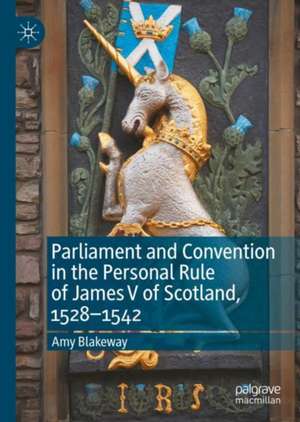Parliament and Convention in the Personal Rule of James V of Scotland, 1528–1542
Autor Amy Blakewayen Limba Engleză Hardback – 18 feb 2022
| Toate formatele și edițiile | Preț | Express |
|---|---|---|
| Paperback (1) | 729.33 lei 6-8 săpt. | |
| Springer International Publishing – 19 feb 2023 | 729.33 lei 6-8 săpt. | |
| Hardback (1) | 692.07 lei 3-5 săpt. | +25.25 lei 6-12 zile |
| Springer International Publishing – 18 feb 2022 | 692.07 lei 3-5 săpt. | +25.25 lei 6-12 zile |
Preț: 692.07 lei
Preț vechi: 865.08 lei
-20% Nou
Puncte Express: 1038
Preț estimativ în valută:
132.43€ • 144.30$ • 111.59£
132.43€ • 144.30$ • 111.59£
Carte disponibilă
Livrare economică 03-17 aprilie
Livrare express 19-25 martie pentru 35.24 lei
Preluare comenzi: 021 569.72.76
Specificații
ISBN-13: 9783030893767
ISBN-10: 3030893766
Pagini: 408
Ilustrații: XIV, 361 p.
Dimensiuni: 148 x 210 x 28 mm
Greutate: 0.6 kg
Ediția:1st ed. 2022
Editura: Springer International Publishing
Colecția Palgrave Macmillan
Locul publicării:Cham, Switzerland
ISBN-10: 3030893766
Pagini: 408
Ilustrații: XIV, 361 p.
Dimensiuni: 148 x 210 x 28 mm
Greutate: 0.6 kg
Ediția:1st ed. 2022
Editura: Springer International Publishing
Colecția Palgrave Macmillan
Locul publicării:Cham, Switzerland
Cuprins
Chapter 1: Introduction.- Chapter 2: Council and Conventions.- Chapter 3: Conventions of the Lords, War and Wedlock: Public or Private Consultation?.- Chapter 4: Consultation and Access for the Third Estate.- Chapter 5: Taxation and Finance.- Chapter 6: Legislation, Treason and Parliament.- Chapter 7: Conclusion.
Notă biografică
Amy Blakeway is Lecturer in Scottish History at the University of St Andrews, UK. She is the author of Regency in Sixteenth-Century Scotland (2015) and has published articles in the English Historical Review, History, the Historical Journal, and the Economic History Review.
Textul de pe ultima copertă
This book, based on a fresh understanding of Scottish governmental records rooted in extensive archival research, offers the first study of these important institutions in a period of revived royal authority. The regime which emerges from these records is one which understood the power of consultation, adroitly using a range of groups from full parliaments to conventions of specialists and experts selected to deal with the matter in hand. Policies were crafted through not one single meeting but several types of gathering, ranging from small groups when secrecy was of the essence or complex details required to be hammered out, to elaborate large gatherings when the regime employed a performative strategy to disseminate information or legitimise its policies. Still more impressively, much of this was managed in the King’s absence – James remained at a distance from many of these gatherings, relying on key officials such as the Chancellor or Clerk Register to relay counsel and the royal will. This emphasis on specialised, frequent consultation reflects concurrent developments in the council, whilst relocating debate surrounding the development of state and administrative structures in Scotland traditionally located in the late sixteenth-century into the 1530s. In tackling the development of parliament in Scotland and placing it in its proper context amongst many different forms of consultative meeting this book also speaks to subjects of European-wide concern: how far early modern Parliaments were used to impose or resist religious change, the pace of state formation, monarchical power and relations between monarchs and their subjects.Amy Blakeway is Lecturer in Scottish History at the University of St Andrews, UK. She is the author of Regency in Sixteenth-Century Scotland (2015) and has published articles in the English Historical Review, History, the Historical Journal, and the Economic History Review.
Caracteristici
Provides the first study of Scottish governmental institutions in a critical period in their development Argues that governmental administrative and institutional activities in this period helped assert royal authority Examines institutions such as Parliament, Conventions of the Lords, Conventions of the Burghs and the Council
